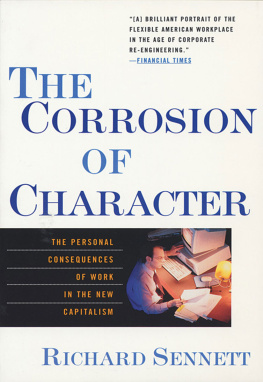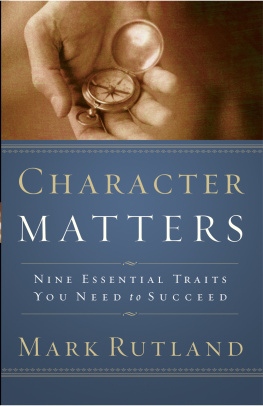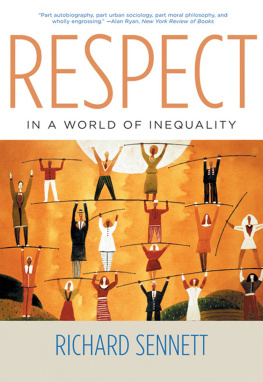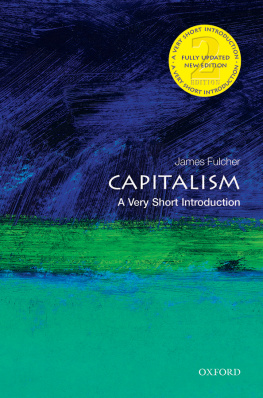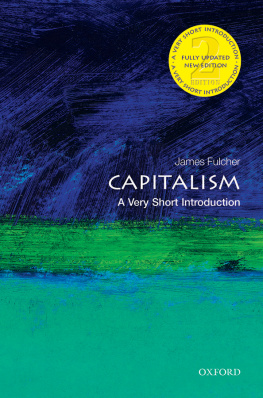W. W. Norton & Company
For information about permission to reproduce selections from this book, write to Permissions, W. W. Norton & Company, Inc., 500 Fifth Avenue, New York, NY 10110.
W. W. Norton & Company, Inc., 500 Fifth Avenue, New York, N. Y. 10110
http://www.wwnorton.com
W. W. Norton & Company Ltd., 10 Coptic Street, London CW1A 1PU
Preface
T oday the phrase flexible capitalism describes a system which is more than a permutation on an old theme. The emphasis is on flexibility. Rigid forms of bureaucracy are under attack, as are the evils of blind routine. Workers are asked to behave nimbly, to be open to change on short notice, to take risks continually, to become ever less dependent on regulations and formal procedures.
This emphasis on flexibility is changing the very meaning of work, and so the words we use for it. Career, for instance, in its English origins meant a road for carriages, and as eventually applied to labor meant a lifelong channel for ones economic pursuits. Flexible capitalism has blocked the straight roadway of career, diverting employees suddenly from one kind of work into another. The word job in English of the fourteenth century meant a lump or piece of something which could be carted around. Flexibility today brings back this arcane sense of the job, as people do lumps of labor, pieces of work, over the course of a lifetime.
It is quite natural that flexibility should arouse anxiety: people do not know what risks will pay off, what paths to pursue. To take the curse off the phrase capitalist system there developed in the past many circumlocutions, such as the free enterprise or private enterprise system. Flexibility is used today as another way to lift the curse of oppression from capitalism. In attacking rigid bureaucracy and emphasizing risk, it is claimed, flexibility gives people more freedom to shape their lives. In fact, the new order substitutes new controls rather than simply abolishing the rules of the pastbut these new controls are also hard to understand. The new capitalism is an often illegible regime of power.
Perhaps the most confusing aspect of flexibility is its impact on personal character. The old English speakers, and indeed writers going back to antiquity, were in no doubt about the meaning of character: it is the ethical value we place on our own desires and on our relations to others. Horace writes that the character of a man depends on his connections to the world. In this sense, character is a more encompassing term than its more modern offspring personality, which concerns desires and sentiments which may fester within, witnessed by no one else.
Character particularly focuses upon the long-term aspect of our emotional experience. Character is expressed by loyalty and mutual commitment, or through the pursuit of long-term goals, or by the practice of delayed gratification for the sake of a future end. Out of the confusion of sentiments in which we all dwell at any particular moment, we seek to save and sustain some; these sustainable sentiments will serve our characters. Character concerns the personal traits which we value in ourselves and for which we seek to be valued by others.
How do we decide what is of lasting value in ourselves in a society which is impatient, which focuses on the immediate moment? How can long-term goals be pursued in an economy devoted to the short term? How can mutual loyalties and commitments be sustained in institutions which are constantly breaking apart or continually being redesigned? These are the questions about character posed by the new, flexible capitalism.
A QUARTER CENTURY AGO , Jonathan Cobb and I wrote a book about working-class Americans, The Hidden Injuries of Class. In The Corrosion of Character, Ive taken up some of the same issues about work and character in an economy which has changed radically. The Corrosion of Character is intended to be a long essay rather than a short book; that is, Ive tried to write out a single argument, whose sections are divided into very short chapters. In The Hidden Injuries of Class, Jonathan Cobb and I relied exclusively on formal interviews. Here, as befits an essay-argument, Ive used more mixed and informal sources, including economic data, historical accounts, and social theories; Ive also explored the daily life around me, much as an anthropologist might.
At the outset, I should point out two things about this text. The reader will often find philosophical ideas applied to or tested by the concrete experience of individuals. For this I make no apology; an idea has to bear the weight of concrete experience or else it becomes a mere abstraction. Second, Ive disguised individual identities rather more heavily than one would when reporting formal interviews; this has meant changing places and times and occasionally compounding several voices into one or splitting one voice into many. These disguises put demands on the readers trust, but not the trust a novelist would seek to earn through a well-made narrative, for that coherence is now lacking in real lives. My hope is that I have accurately reflected the sense of what Ive heard, if not precisely its circumstances.
All the notes for essay text appear at the end of the text. Ive also placed at the end some statistical tables, prepared by Arturo Sanchez and myself, which help illustrate some recent economic trends.
I LEARNED A GREAT DEAL about work from Jonathan Cobb a quarter century ago. I returned to this subject at the urging of Garrick Utley, and was helped in pursuing it by Bennett Harrison, Christopher Jencks, and Saskia Sassen; The Corrosion of Character tries to fathom some personal implications of the discoveries they all have made about the modern economy. To my graduate assistant Michael Laskawy, I owe a debt of intellectual companionship and also of forbearance in dealing with the various practical issues which attend research and writing.
This essay began as a Darwin Lecture, given at Cambridge University in 1996. The Center for Advanced Study in the Behavioral Sciences afforded me the time to write this book.
Finally, I would like to thank Donald Lamm and Alane Mason, of W. W. Norton & Company, and Arnulf Conradi and Elizabeth Ruge of Berlin Verlag, who helped me shape the manuscript.

